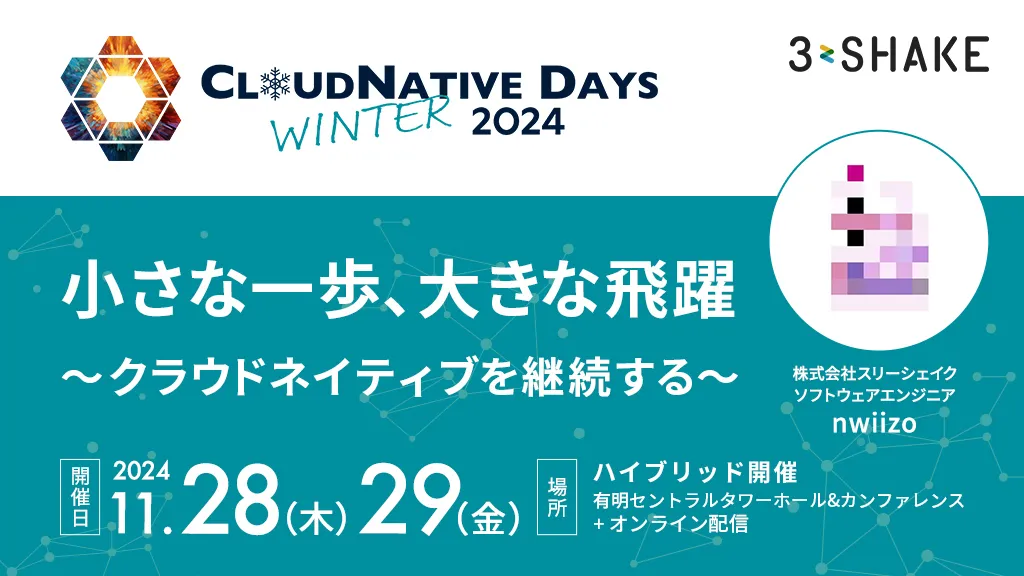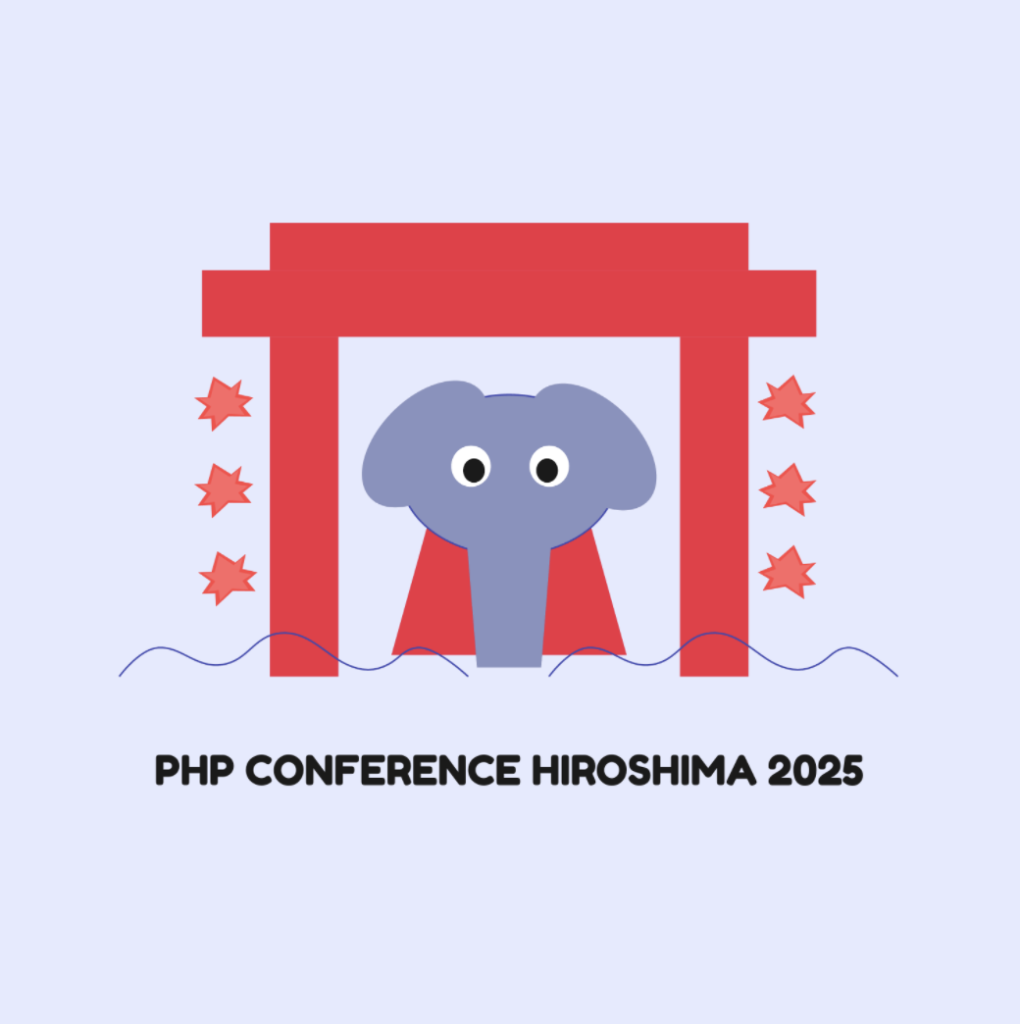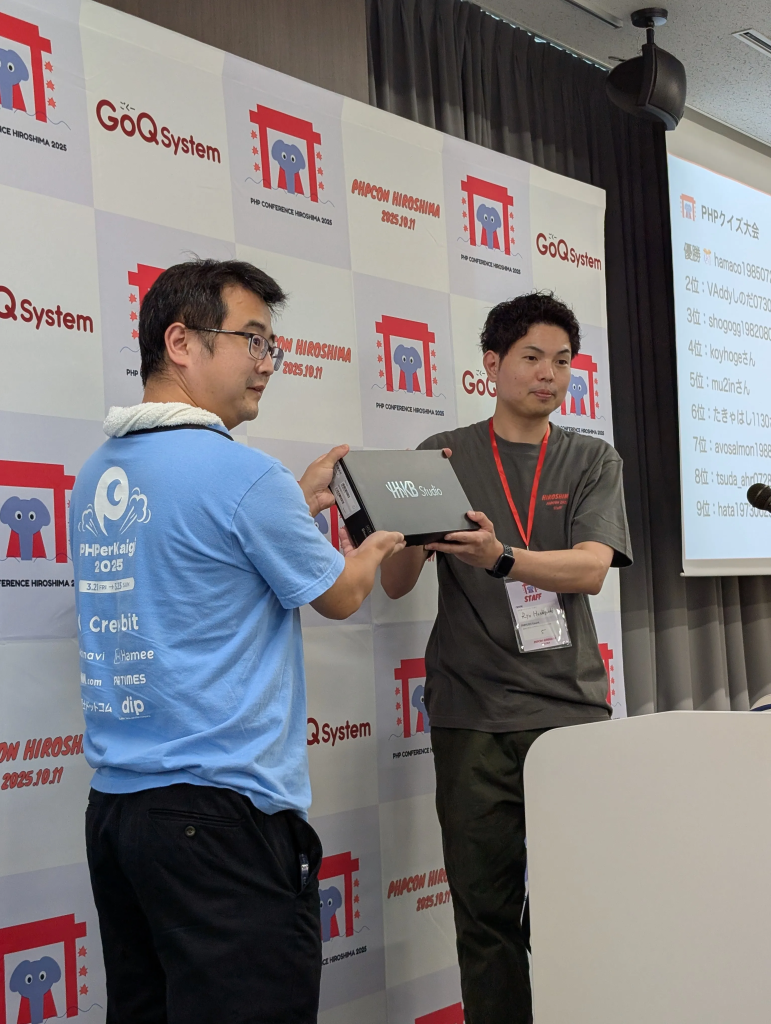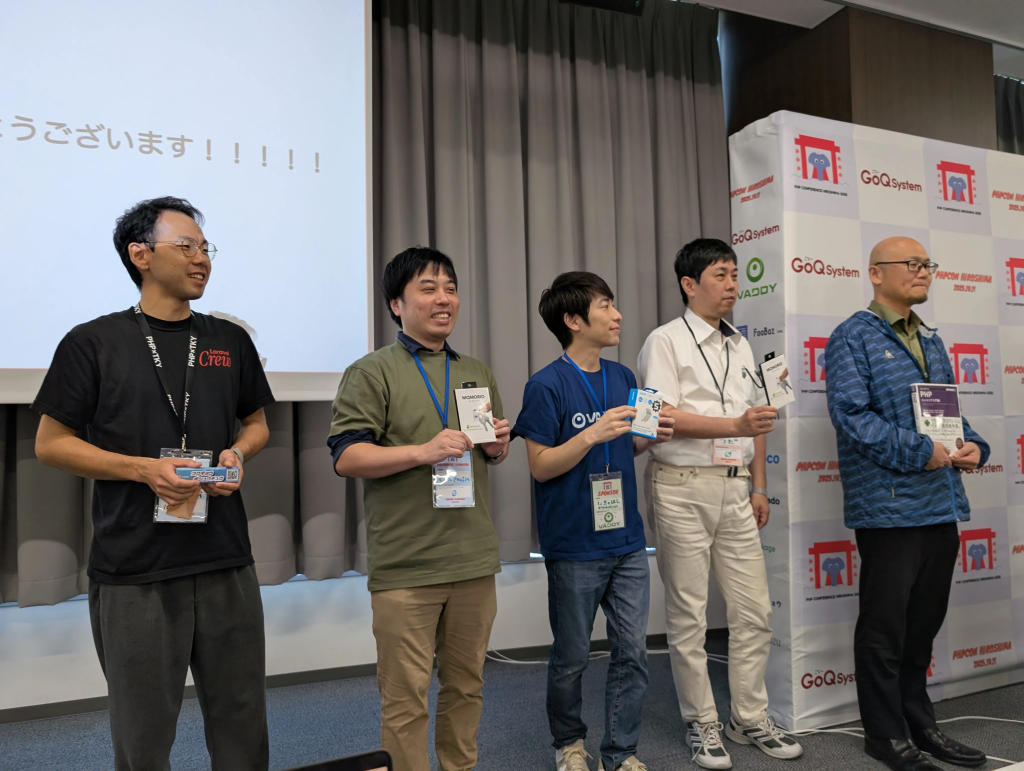The World of Japanese Tech Conferences: A Retelling of PHP Conference Hiroshima 2025

Hi! This is Amine (@realaminevg) from the Sreake team.
Last week was sunny in Hiroshima! And it was also home for PHP Conference Hiroshima 2025, the first PHP conference in the region. I got to attend the event and even host a Lightning Talk there!
In this article, we’ll go through why PHP conferences (or PHPcon for short) are so popular in Japan, and you’ll get a retelling of the main event, talks, quizzes and all! Get yourself some Okonomiyaki 🥞 and strap in!

PHP conferences in Japan: so many of them
While there are many tech conferences around the world, PHP ones aren’t very common (with the main exception being Laracon). This is not the case for Japan, as it hosted 10 PHP conferences (or PHPcons) this year alone!
Why are PHPcons so popular in Japan? It’s likely due to a combination of factors:
- PHP being used in large companies as well as new startups
- The language not experiencing decline in the early 2010s as in other countries
- The Japanese community around PHP being very strong, with their own blogs and OSS projects
This results in PHPcons being hosted all over the country, including Tokyo, Kobe, Hiroshima, Fukuoka and more!
A retelling of PHP Conference Hiroshima 2025
A PHP conference in Hiroshima was long overdue, since there were PHPcons in southern Japan (Fukuoka) and west/north Japan (Kobe/Tokyo), but not in between.
This changed with PHP Conference Hiroshima 2025, the first conference in the region! Hosting seven regular talks, five lightning talks, and welcoming 80 participants, this medium-scale PHPcon went very smoothly.
PHP Conference Hiroshima 2025’s theme was “Learn, bond, persevere with PHP” (自由に学び、つながり、つづく、PHPと共に). And true to the message, there was a lot to learn from everyone!

Regular Talks
There also seven regular talks (fifteen-minute talks) at the event.
How to approach database design in the age of AI
Original title: AI時代の今こそ必要なDBとの付き合い方 – データベースリファクタリングと継続的デプロイ
Speaker: Takemoto Sone (曽根 壮大) @soudai1025
Key points
- AI can replace simple DB migrations, but it cannot replace proper DB design
- AI makes you more productive in the short run, but you have to design your DB correctly to maintain productivity long-term
- Business needs always change, so system requirements always change
- DB design skills are very important, AI isn’t gonna take away that from you
- AI replaces grunt work, not skilled work
Learn more in @soudai1025‘s blog post!
Legacy systems and PHP
Original title: レガシープロダクト開発の目線から見るこれからの PHP との付き合い方
Speaker: Taisuke Arase (荒瀬 泰輔) @at_taisuke
Key points
- Upgrading a long-running application (Garoon) from PHP 4 to 8 is not simple
- Garoon had little test coverage (20% test coverage for a 1M+ LOC codebase!)
- Version upgrades are necessary for security and future-proofing, but that is hard to understand from a business perspective
- Your OSS dependencies will influence the upgrade process, as each package has its own PHP version support policy
- Upgrade often, but not right away; wait for the dust to settle and for the ecosystem to catch up
Static analysis in PHP
Original title: なんでいま静的解析なの? PHPで学ぶ「静」と「動」
Speaker: Kenta Usami (うさみけんた) @tadsan
Key points
- Static and dynamic behaviors are a key part of how the Web works
- Responses being static or dynamic (either server- or client-side) will influence how you design your application, and you have to understand tradeoffs
- Dynamic languages enable duck typing, which enables infinite possibilities but is not great for program correctness
- PHP is a dynamic language, but you can check for correctness statically using PHPStan
- Run PHPStan to check for correctness, and PHPUnit to check for business logic
Learn more in @tadsan‘s slides!
Writing robust, functional code in PHP 8.5
Original title: PHPに関数型の魂を宿す〜PHP 8.5 で実現する堅牢なコードとは〜
Speaker: Shogo Kawase (河瀨 翔吾) @shogogg
Key points
- PHP, especially since 5.x, has historically been an object-oriented programming language, but has recently been adding functional programming features
- With computers getting faster, correctness became more important than raw performance
- With functional programming, AI can analyze/generate code with a smaller context window
- In PHP 8.5, we have a significant functional programming addition: the pipe operator
- The NoDiscard attribute, intended to throw a warning when ignoring return values, can be used to enable a userland result pattern
Counting up technical debt
Original title: 技術的負債の会計学
Speaker: @aki_artisan
Key points
- How do you define technical debt? More importantly, how much are you thinking about technical debt?
- Unneeded features can be retired without thinking about technical debt; needed features can be paid in advance with technical debt, and that debt can be repaid using the money generated from the features
- Technical debt comes with interest, usually in the form of code being harder to read and change
- Technical debt doesn’t go into a real-world balance sheet, so you get into debt before you realize it, and it’s hard to figure out how and what to repay
- Facing technical debt: don’t get into debt if you can help it, explain the pitfalls to stakeholders if you have to go into debt
From Scripts to Silicon: A Journey Through the Layers of Computing
Original title: PHPからはじめるコンピュータアーキテクチャ
Speaker: Tomoki Hasegawa (長谷川智希) @tomzoh
Key points
- Programs are executed either directly by the CPU as machine code, or by an interpreter reading source code line by line
- Languages like Go compile directly to machine code, whereas PHP code, even with the introduction of JIT, needs to be interpreted
- Modern computer systems are built on layers of abstraction, with each layer only needing to communicate with layers surrounding it
- It is possible to build additional layers on top of PHP: there is a PHP implementation of the JVM, and even a NES terminal emulator written in PHP!
- Real-world applications of abstraction layers are all around, such as Rosetta 2 (allowing Mac Intel programs to run on Apple Silicon), virtual machines (Docker/QEMU/AWS EC2/etc.) and backwards compatibility in video game consoles
The Distance Between Code, You, and I
Original title: コードとあなたと私の距離
Speaker: Hiroyuki Yamaoka (山岡広幸) @hiro_y
Key points
- Everyone likes writing code, especially code that works. Why is that?
- For better or worse, humans tend to associate code with the person who wrote it
- If you told AI to write code, do you fully understand that code? Do you feel like you really own that code?
- If you don’t feel like AI-written code is your code, then you may look at that code more objectively, and can review your own code more efficiently
- If only AI writes the code, why even bother with programming languages? Why not write in machine code directly? Well, what happens when AI makes an error and someone has to fix it?
Lightning talks
There also were five lightning talks (five-minute talks) at the event:
- “Running a Hiroshima-focused community service: lessons learned from small-scale development” (広島特化のコミュニティーサービス、小規模開発 × 長期運用がくれたもの) by @msng
- “Building a Modern Monolith with Inertia.js” (Modern Monolithを作りましょう!Inertia.jsの紹介とその先) by Amine Ilidrissi @realaminevg (that’s me!)
- “Writing properties inside interfaces in PHP 8.4.0!!” (ついにきた! PHP 8.4.0 からインターフェースにプロパティが書けるようになったぞ!!!!) by @i999rri
- “Facing myself and procrastination” (やる気のない自分との向き合い方) by @sanogemaru
- “Getting open metrics from PHP-FPM: the gist, pitfalls, and differences from other tools” (PHP-FPMのみでメトリクスを出力してみたので,その設定例と落とし穴, 外部ツールを使う場合との違いについてお話しします!) by @daichi_164237
Quiz time!
There also was a live quiz centered around really hard PHP questions (and two sneaky Hiroshima questions). Congratulations to the quiz winners!


More PHP conferences in Japan coming up!
This concludes this retelling of PHP Conference Hiroshima 2025! What was your favorite talk? 🙌
If you’re itching to attend a PHPcon in Japan, I have some good news for you! There are a lot of upcoming PHP conferences in 2025 and beyond:
- PHP Conference Fukuoka 2025, November 11, 2025
- PHP Conference Kagawa 2025, November 23-24, 2025
- PHPerKaigi 2026, March 20-22, 2026
- PHP Conference Odawara 2026, April 10-11, 2026
- PHP Conference Kagawa 2026, May 8-10, 2026
- Laravel Live Japan 2026, May 26-27, 2026
I myself plan to attend at least one of these, so I hope to see you there 👋
Until then, Happy Coding in PHP! 🐘